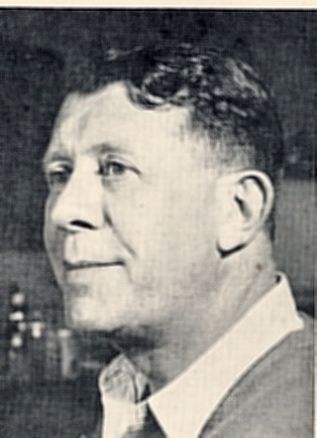View entry
Name: HILL, Mervyn Frederick George Saxon

Nee: son of Frederick William Hill
Birth Date: 1904 Colombo, Sri Lanka
Death Date: 14 Dec 1965 Nakuru
First Date: 1920s
Profession: Editor of the 'Kenya Weekly News'
Area: Box 671, Nairobi, Turi
Married: Sheila
Children: Julia; another dau.
Author: 'Cream Country', 'Permanent Way', The Dual Policy in Kenya (1944)
Book Reference: KFA, Wymer, Vulture, Red 25, Red 31, Hut, Barnes
General Information:
Nakuru North cemetery - Mervyn Hill - 1904-1968 [sic] - porta vacat culpa
Red 25 - Plateau Secretary, Agricultural and Horticultural Society of Kenya
Gazette 15 Feb 1966 probate
A. European critic of the colonial government to get in trouble was the editor of the Kenya Weekly News, Mervyn Hill, who was fined $1,300 for criticizing suggestions that Kenya should become a multiracial state.
Kenya Weekly News folded in 1869
www.cambridge.org/core/journals/journal-of-african-history/article/rooting-out-of-mau-mau-from-the-min A central part of improving information services was establishing clear guidelines for communication between the government and the press. The East African Standard (EAS) faithfully cooperated with the government throughout the Emergency. East Africa Command records demonstrate that the army considered its editor – Mr. Kinnear – ‘completely trustworthy’, and recommended providing him with extra information so that he might prevent his journalists from following hunches and potentially revealing critical information by mistake. The settler Kenya Weekly News and Sunday Post had similar allegiances, although the editor of the former – Mervyn Hill, who had worked at the Kenya Information Office during the Second World War – had been prosecuted for sedition in 1947.
www.sahistory.org.za/sites/default/files/archive-files3/gerard_loughran_birth_of_a_nation_the_story_of_book4me.org_.pdf The Kenya Weekly News magazine was founded in Nakuru by Frank Couldrey, and the principal shareholder was his son Jack, a Nairobi lawyer. Wholly devoted to settler interests (its first edition carried an article on the price of maize and so did its last), it became known as the ‘pea-green incorruptible’ for the colour of its cover and the feisty staunchness in the farmers’ cause of its editor, Mervyn Hill. A promotional ditty popular at the time ran: Sam the settler’s in despair, He wrings his hands, he tears his hair, His temper you will please excuse, He’s lost his Kenya Weekly News. Hill’s chequered career had included a run-in with the law which barred him from membership of the Rift Valley Sports Club. But he was widely admired as the author of Permanent Way, the definitive history of the construction of the railway from Mombasa to Uganda, and according to Ensoll, his Nairobi editor in the late 1950s, he was ‘a total amateur but the best journalist I ever came across’. Hill was consulted not only by the colonial rulers in Nairobi but by Whitehall, too, as negotiations on the shape of an independent Kenya gathered pace. Ensoll himself was convinced settler hegemony was over and when later he became editor of the Sunday Post, he pressed for a multiracial, power-sharing arrangement for the Kenya of the future. ‘When I started running that policy,’ he said, ‘invitations poured in from the Muthaiga Club and I would have lunch with the Governor one day and the arch-settler Ewart Grogan the next. The settlers already knew they were on a hiding to nothing.’ But when he spoke one day with the nationalist Dr Kiano, Ensoll realised his naive dream of a rainbow-hued Kenya was doomed: ‘I put the usual settler argument to him: If we go for one-man, one-vote, the whites will be swamped and we are so important to the economy, run all the business, employ so many Africans, what’s going to happen? And he said coolly, “You will have to rely on African good will”. That was a big message to me.’
For years, the Kenya Weekly News had chronicled the problems of the settler farmers, faithfully printing crop and cattle prices, usually to the sound of loud lamentations. The following verse became the farmers’ anthem: Maize, maize, maize, How odd that it never pays, Despite all our toil And magnificent soil And the most scientific of ways. As the reality of approaching independence dawned, the Nakuru magazine’s focus moved from maize and pyrethrum prices to Nairobi and politics. But history was already passing the settler by. The Kenya Weekly News lost its core readership as the whites departed and Africans moved onto their farms. The editor, Mervyn Hill, collapsed and died at his desk in December 1965,.
